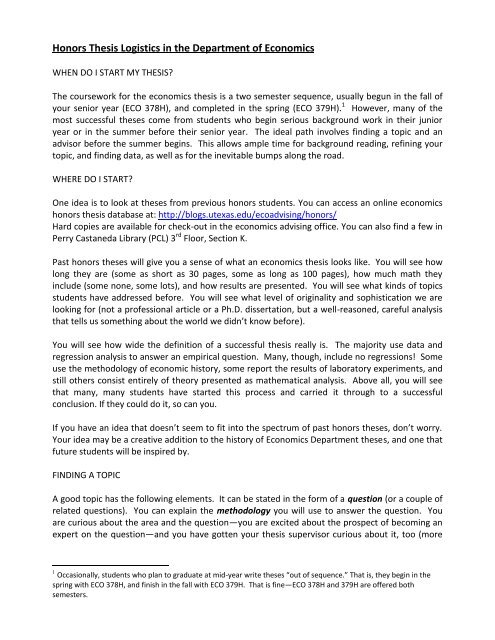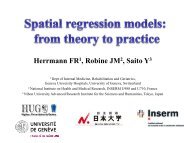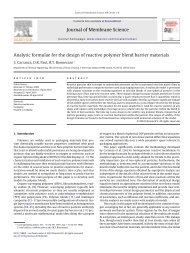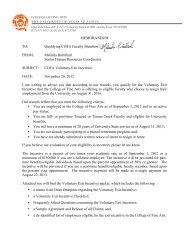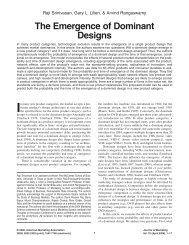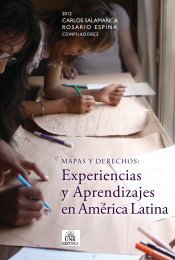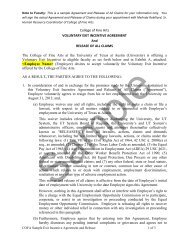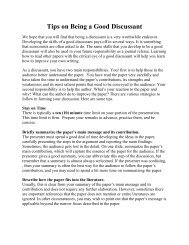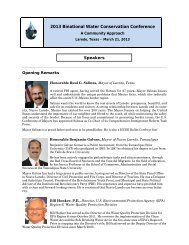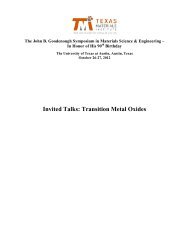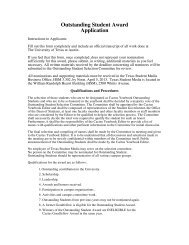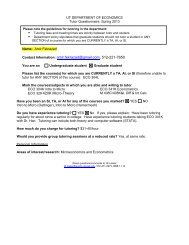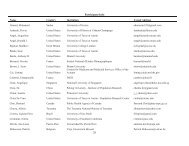Senior Thesis Logistics Department of Economics - University Blog ...
Senior Thesis Logistics Department of Economics - University Blog ...
Senior Thesis Logistics Department of Economics - University Blog ...
You also want an ePaper? Increase the reach of your titles
YUMPU automatically turns print PDFs into web optimized ePapers that Google loves.
Honors <strong>Thesis</strong> <strong>Logistics</strong> in the <strong>Department</strong> <strong>of</strong> <strong>Economics</strong>WHEN DO I START MY THESIS?The coursework for the economics thesis is a two semester sequence, usually begun in the fall <strong>of</strong>your senior year (ECO 378H), and completed in the spring (ECO 379H). 1 However, many <strong>of</strong> themost successful theses come from students who begin serious background work in their junioryear or in the summer before their senior year. The ideal path involves finding a topic and anadvisor before the summer begins. This allows ample time for background reading, refining yourtopic, and finding data, as well as for the inevitable bumps along the road.WHERE DO I START?One idea is to look at theses from previous honors students. You can access an online economicshonors thesis database at: http://blogs.utexas.edu/ecoadvising/honors/Hard copies are available for check-out in the economics advising <strong>of</strong>fice. You can also find a few inPerry Castaneda Library (PCL) 3 rd Floor, Section K.Past honors theses will give you a sense <strong>of</strong> what an economics thesis looks like. You will see howlong they are (some as short as 30 pages, some as long as 100 pages), how much math theyinclude (some none, some lots), and how results are presented. You will see what kinds <strong>of</strong> topicsstudents have addressed before. You will see what level <strong>of</strong> originality and sophistication we arelooking for (not a pr<strong>of</strong>essional article or a Ph.D. dissertation, but a well-reasoned, careful analysisthat tells us something about the world we didn’t know before).You will see how wide the definition <strong>of</strong> a successful thesis really is. The majority use data andregression analysis to answer an empirical question. Many, though, include no regressions! Someuse the methodology <strong>of</strong> economic history, some report the results <strong>of</strong> laboratory experiments, andstill others consist entirely <strong>of</strong> theory presented as mathematical analysis. Above all, you will seethat many, many students have started this process and carried it through to a successfulconclusion. If they could do it, so can you.If you have an idea that doesn’t seem to fit into the spectrum <strong>of</strong> past honors theses, don’t worry.Your idea may be a creative addition to the history <strong>of</strong> <strong>Economics</strong> <strong>Department</strong> theses, and one thatfuture students will be inspired by.FINDING A TOPICA good topic has the following elements. It can be stated in the form <strong>of</strong> a question (or a couple <strong>of</strong>related questions). You can explain the methodology you will use to answer the question. Youare curious about the area and the question—you are excited about the prospect <strong>of</strong> becoming anexpert on the question—and you have gotten your thesis supervisor curious about it, too (more1 Occasionally, students who plan to graduate at mid-year write theses “out <strong>of</strong> sequence.” That is, they begin in thespring with ECO 378H, and finish in the fall with ECO 379H. That is fine—ECO 378H and 379H are <strong>of</strong>fered bothsemesters.
elow <strong>of</strong> finding a supervisor). Finally, the research you propose should contribute something newto what is known about the subject <strong>of</strong> your inquiry.Being able to state your topic as a question is important. You aren’t writing “about” something.Thinking about the methodology for answering the question at the same time as you areformulating your topic is the single best way to make sure your proposed research is feasible, inthe time you have. The methodology points you to the information and skills you’ll need (data,models, statistical methods, s<strong>of</strong>tware, etc.).For many students, finding a topic is the hardest part <strong>of</strong> the process! But don’t be discouraged—it’s normal for it to take a while to come up with a topic that is neither too broad nor too narrow,ambitious enough to be really exciting, and limited enough to be feasible to complete in six-eightmonths. It may feel like your advisor is shooting down your ideas—but in fact, your advisor ishelping you sharpen your question, eliminate false leads, and develop a clear methodology. Inshort, your advisor is initiating you into the process <strong>of</strong> doing original research. Critical thinkingproduces good research!So avoid the temptation to narrow your search for a topic too quickly! Read and explore, talk topeople, and make lists. It’s OK to have multiple possible topics in play, to begin. Quite frequently,students need the first month or two <strong>of</strong> ECO 378H to fully develop their topic. You’ll know you’rethere when you and your advisor (and your friends!) are excited about your question, and theproject (methodology for executing your topic) seems to be a good scale for two semesters.How do you start? Ask yourself what areas interest you the most. Sovereign debt crises? Healthcare reform? Immigration? Micr<strong>of</strong>inance and group lending? Rural-urban migration in China?Eliminating polio in Africa (is a “vertical” disease-by-disease strategy or a focus on economicgrowth more effective)? Executive compensation? Gender differences in career choices?Financial market reform? Your search at this point should be more specific than a subfield (morespecific than “I’m interested in economic development and finance”), but less specific than a fullyformedresearch question (“Do different ways <strong>of</strong> choosing the ‘groups’ in micro-lending to ajointly-liable group result in different repayment rates?”). Sometimes the most unique andcreative topics arise from a student’s own experience. For example an internship at a real estateappraisal company may uncover interesting theoretical and empirical questions about how wellhome price indexes measure true home price movements, or a summer abroad helping the poor inthe Dominican Republic may open the door to a thesis on the impact <strong>of</strong> education on wages indeveloping countries.Once you have several possible areas, read. Not just economics literature, but newspapers (NewYork Times, Wall Street Journal, Financial Times), magazines (The Economist), blogs (GregMankiw’s blog is excellent), and anything else you can get your hands on that seems relevant.What questions do people who care about this subject think are important? What are the puzzlespeople don’t understand? What kinds <strong>of</strong> evidence have people brought to bear on thesequestions or similar questions? What information do reporters writing about this area cite—dothey really have evidence to back up their claims, or are they just telling stories (which you don’twant to do!)? You don’t necessarily have to wait until you have narrowed down your interests tobegin reading-- reading can be the first step to identifying possible topic areas <strong>of</strong> interest too.
As far as economics literature goes, don’t read papers in detail at this point. You want to get ageneral sense <strong>of</strong> what kinds <strong>of</strong> questions economists seem to think are important, how they havegone about trying to answer those questions, and what kinds <strong>of</strong> data they have brought to bear.Read abstracts, introductions, and sections on data and empirical methodology. Also, read surveyarticles in the Journal <strong>of</strong> Economic Perspectives and the Journal <strong>of</strong> Economic Literature. Thesetend to be accessible, they’ll give you a clear overview <strong>of</strong> recent research, and they’re available (inelectronic form) at UT.After a couple <strong>of</strong> weeks or months <strong>of</strong> this, your head will be overflowing with ideas and questions.Now start brainstorming about specific research questions. List lots <strong>of</strong> possible questions. Talkabout them with your fellow students, friends, parents, siblings, and pr<strong>of</strong>essors (more aboutpr<strong>of</strong>essors below). If you can explain your topic to a parent, that’s a good sign, and if they thinkit’s interesting, that’s a very good sign!This process—listing, explaining, discussion—will help you cull two or three favorite questions thatseem interesting, specific, and (to the best <strong>of</strong> your knowledge) have not been answered before. Atthis point you can congratulate yourself. You are ready to dig into serious research.FINDING A SUPERVISORAs soon as you can articulate a handful <strong>of</strong> areas that interest you, you should talk to facultymembers about your interests. Talk to as many as possible. Don’t worry at this point about whowill end up as your advisor. Send e-mails to make appointments. We have a diverse economicsfaculty—this is your chance to take advantage <strong>of</strong> it. You don’t need an excuse or specialpermission or to have taken their course.You should come in prepared to talk in detail about your areas <strong>of</strong> interest. You don’t have to waituntil you’ve narrowed your list <strong>of</strong> questions—it’s good to get faculty input on that, and faculty maycome up with additional questions for your list—but you should have done enough backgroundreading to discuss your areas <strong>of</strong> interest in detail. If you can hand them a list <strong>of</strong> possible questions,all the better—they may or may not read it, but it helps you organize your thoughts and makesyou look prepared. Once again, at this point you needn’t propose specific research questions. Youwant to find out what aspects <strong>of</strong> your ideas they find interesting, what work has been done, andwhat directions they think you should go in next.At the same time, you will be getting to know them. You will see who seems most interested inyour topic, and whether you connect with them personally. It’s OK to ask questions about theirresearch interests, although that’s not necessary. You can get to know a little bit about the facultyand their research ahead <strong>of</strong> time by visiting the faculty page on the <strong>Economics</strong> <strong>Department</strong>website (http://www.utexas.edu/cola/depts/economics/faculty/list.php), where you will find thefaculty’s curriculum vitae. You can search by name or by research area. Many pr<strong>of</strong>essors in otherdepartments at UT have Ph.D.’s in economics and conduct research on economics-related topics(business, government, public policy, psychology, sociology, applied math, population center).Your supervisor may be a UT faculty member from outside the <strong>Economics</strong> <strong>Department</strong>, as long asyour topic and methodology are based on economic analysis (you’ll need the economics honorsadvisor to sign <strong>of</strong>f on an outside advisor, and you may be required to secure a “second reader”from within the <strong>Economics</strong> <strong>Department</strong>, which the honors advisor will help you to do). You can
use Eureka to find faculty conducting economics-related research all over campus(http://www.utexas.edu/research/eureka/).At some point, ideally during spring <strong>of</strong> junior year but without fail before the Fall semester <strong>of</strong> yoursenior year actually gets under way, you should choose the one faculty member who you seem toconnect with the best, and ask him or her to be your <strong>of</strong>ficial advisor. Pr<strong>of</strong>essors rarely say no tostudents whom they perceive to be serious, prepared, and genuinely interested in an interestingand feasible topic. But if you find that you are having trouble getting a faculty member to adviseyou, feel free to contact the faculty honors advisor for additional guidance.ECONOMICS 378H/379HYou will need to enroll in ECO 378H (Honors Tutorial I) for the first semester <strong>of</strong> your senior thesis(usually Fall), and then ECO 379H (Honors Tutorial II) for the second semester <strong>of</strong> your senior thesis(usually Spring). You can’t write a thesis without enrolling in these classes, and you can’t enroll inthese classes if you’re not writing a thesis. Successful completion <strong>of</strong> this two-course sequencemeans you will graduate with department honors.These tutorial courses are designed to give structure to the thesis process. You and yoursupervisor will also work out a schedule to meet one-on-one regularly throughout the semester.Your faculty supervisor will provide you with guidance to help manage a long process. There willalso be an optional informal meeting time once per week (open the full course description in thecourse schedule to see meeting time) to provide time for you to work independently on yourthesis, to allow peer interaction and review, and for occasional instruction or speakers.Before enrolling in ECO 378H you must find a suitable idea for a topic and a faculty supervisor (seeabove). The topic doesn’t have to be in its final form—it is more common than not that thequestion evolves once you get started—but it must be clear that at least provisionally, you have agood question and a feasible methodology for answering it. Pick up a thesis pre-registration formfrom the honors coordinator, attach your thesis proposal, and take it to your faculty supervisor fortheir signature. Return the signed form and thesis proposal to the honors coordinator, who willobtain final approval from the honors advisor and register you in the class. You can find a link tosample thesis proposals here: http://blogs.utexas.edu/ecoadvising/honors/Once registered, the honors coordinator will provide you with a general timeline for the semester;however, it will be your responsibility to work out a time-table, and requirements along the way,with your faculty supervisor. There is a natural flow. For the first couple <strong>of</strong> months, you aregathering sources and data, reading in depth, and making outlines. A good target for having apreliminary outline is November. By the last class day in December, your “fall paper” is due. Thisis typically about 20 pages, and it includes an abstract (basically, an updated proposal), a first draft<strong>of</strong> your introduction, a detailed outline, and a list and description <strong>of</strong> sources (including datasources, if relevant). Frequently, students include short summaries <strong>of</strong> especially importantmaterial they’ve read, or drafts <strong>of</strong> pieces <strong>of</strong> the thesis. The exact content <strong>of</strong> your fall paper isnegotiated with your advisor (well in advance!), because it depends on your topic. But keep inmind that your fall paper is the basis <strong>of</strong> your grade in ECO 378H! If you don’t make enoughprogress, or if you haven’t documented what you’ve done, you may end up getting less than an A,or taking an incomplete.
In January and February, you complete any remaining research and conduct your data analysis (ifyou are writing a thesis with data analysis, which is the norm but is not a requirement). Typically,the bulk <strong>of</strong> the writing takes place in March and April. You’ll present your results at an Honors<strong>Thesis</strong> Symposium in mid- to- late April. You don’t need to be done at that point, but <strong>of</strong> course it’svery satisfying to be able to tell the faculty and your peers what you’ve found out through yourresearch, and since you’ll need to have a completed draft shortly after that anyway, it’s a goodtarget date! Work out a timetable <strong>of</strong> rough and final drafts with your supervisor. Note that theflow just described is typical, but your best time-table may be slightly different, depending on yourtopic. What’s important is to negotiate a time-table with your advisor—and revisit it, ifnecessary—and then do your best to stick to it! As hard as it is to do, your experience will be morerewarding, and you’ll write a better thesis, if you adopt a sense <strong>of</strong> urgency from the start. Beprepared to spend several hours a week on your thesis, all along the way—about the samenumber <strong>of</strong> hours as one <strong>of</strong> your more substantial courses! Do not procrastinate—there’s no surerway to kill what might otherwise have been a good thesis—and it is your responsibility to put inthe time.If at the end <strong>of</strong> the fall semester you decide that you won’t be able to finish the thesis, you canreceive credit and a grade in ECO 378H for the first semester’s work but you will not be designatedwith departmental honors upon graduation. Even if you complete ECO 379H, you’ll have to meetthe GPA requirement at graduation to receive departmental honors. If it’s not clear you’ll havethe necessary GPA, discuss your situation as soon as possible with the honors coordinator and thehonors advisor. If you wish to continue with your thesis you will need to contact the honorscoordinator and request to enroll in ECO 379H.WRITING IT UPThere is no formal style guide for economics theses. A thesis generally begins with a title page,followed by an abstract, body, and references. Many also include acknowledgements, a table <strong>of</strong>contents, and/or appendices. Use parenthetical reference style – for example, Friedman (2006) –double space your text, make the margins bigger on the left so the thesis can be bound, and usean 11 or 12 point serif font. If you’re worried about the nitty-gritty details, consult the ChicagoManual <strong>of</strong> Style.In economics, as most everywhere in life, writing matters. Buy and read a small book calledEconomical Writing by Deirdre McCloskey; the advice is invaluable. Look also at Harvard<strong>University</strong>’s handbook called “Writing <strong>Economics</strong>,” which you can find here:http://www.economics.harvard.edu/files/Writing<strong>Economics</strong>.pdfA MODEL TIMETABLE: WHEN TO BE WHEREA realistic timetable for an empirical honors thesis is given below. Of course, there is someflexibility regarding the timing <strong>of</strong> tasks and the necessary tasks will differ for theses that usedifferent methodologies (theory, historical analyses, case studies, etc.). It is important to notethat if you plan to conduct research involving human subjects (such as surveys) you must first
obtain approval from the Institutional Review Board. For more information, see this link:http://www.utexas.edu/ugs/ugr/students/human_subjectso Fall <strong>of</strong> Junior Year -- Talk to the honors coordinator and the faculty honors advisor aboutfunding opportunities available for summer travel and/or research throughout theuniversity. Begin to think <strong>of</strong> topics, potential advisors, and pertinent and available datasets.o Spring <strong>of</strong> Junior Year – Pick up the thesis pre-registration form from the honorscoordinator. This form will formalize your intent to write a thesis and require you to makeinitial contacts with potential supervisors. Continue developing topics and speaking topr<strong>of</strong>essors about signing on to advise your project. Turn in the thesis pre-registration formto the honors coordinator once you have written a thesis proposal and secured asupervisor (aim for the end <strong>of</strong> Spring semester, but no later than the first day <strong>of</strong> the Fallsemester).o Summer before <strong>Senior</strong> Year -- If you have secured funding for travel-related research oracquiring relevant data sets, great! Get this done NOW. Often things go wrong with dataand it’s better to know this sooner rather than later, because you may need to go to Plan Bor change direction. If you have not as yet secured a supervisor, use this time to makecontacts, in person or via email. Do NOT put this <strong>of</strong>f until Fall or you could be leftscrambling.o Fall <strong>of</strong> <strong>Senior</strong> Year – Make sure you have turned in your pre-registration form (completewith supervisor signature and attached thesis proposal) to the honors coordinator andbeen registered for ECO 378H.o Early September -- You should have a thesis topic and a supervisor. Start assembling abibliography <strong>of</strong> relevant sources. Start meeting with your supervisor.o Mid September -- You should be working with your data, reading the literature, andbrainstorming specific approaches to the analysis.o Mid October -- Write a brief review <strong>of</strong> the literature as well as a draft <strong>of</strong> the theory section<strong>of</strong> the thesis. You will find these drafts helpful to build upon. Submit drafts to yoursupervisor.o End <strong>of</strong> October -- You should be running initial diagnostic tests on your data.o November -- Arrange the data into the form you need for analysis. Calculate summarystatistics and get a feel for what the data looks like. Write a section describing your datasource(s) and their strengths and weaknesses. Run preliminary regressions.o December – Submit your “fall paper” to your supervisor and give a copy to the honorscoordinator. This may consist <strong>of</strong> the first chapters <strong>of</strong> the thesis, laying out the question,describing others work and your own approach, outlining the theory, describing the dataand your statistical methodology, etc. Expect to revise it substantially when youincorporate it into your thesis in the spring.o Late January – At the beginning <strong>of</strong> the Spring semester make sure you have turned in yourpre-registration form (complete with supervisor signature) to the honors coordinator andbeen registered for ECO 379H. Work hard at the computer work. Decide what results toreport and how to present them in the thesis. The sooner you have this done, the longeryou'll have to write up the results.
o Beginning <strong>of</strong> February -- Write up your results and interpretations and get feedback fromeveryone willing to read the chapter. This is the fruition <strong>of</strong> the project; make an effort topresent it in an interesting and favorable light.o Mid-February -- Revise everything you’ve written and try to tie the chapters together.Continuity <strong>of</strong> argument and quality <strong>of</strong> exposition are important. Refine the empirical workif necessary.o March -- Try to finish a first complete draft <strong>of</strong> the thesis. Keep in mind that puttingtogether tables, charts, graphs, etc. can be time consuming. Get feedback on anything newthat you’ve included in the draft. Begin preparing a presentation <strong>of</strong> your thesis for theHonors Symposium and/or Research Week occurring in mid-late April. See sample thesispresentation slides here: http://blogs.utexas.edu/ecoadvising/honors/o April -- Final revisions. Compile bibliography and table <strong>of</strong> contents. Prepare title page, etc.Pro<strong>of</strong>read every single word <strong>of</strong> the thesis. Present your thesis at the Honors Symposiumand/or Research Week. The honors coordinator will provide format guidelines for thefinished thesis.o May -- Theses are due on the last class day (see UT Calendar) or the date specified by yoursupervisor. After submission, your supervisor may recommend revisions. Once all revisionshave been made and your supervisor approves your thesis you will submit bound copies (atleast two) for their signature. One signed copy must be submitted to the honorscoordinator by the <strong>of</strong>ficial graduation date <strong>of</strong> the semester (see the UT Calendar). Keep inmind that it takes a long time to print the entire thesis. There are always a few studentswho turn in the thesis a day late (and are penalized) because they misjudged how long itwould take to print the thesis and make a copy.CONCLUDING ADVICERemember that quite likely, your thesis will not follow the path you expect at the start. You mayset out to answer one question, find that what interests you is a different question, abandon thatquestion for lack <strong>of</strong> data, and then stumble onto a third question, which is really interesting,important, and feasible to answer! This process is called search, and it’s how good ideas aredeveloped and explored.Most importantly, remember that all <strong>of</strong> us are here to help you. This includes the faculty, advisors,and administrators. If you have questions or concerns <strong>of</strong> any kind, ask one <strong>of</strong> us.For additional guidance, please also see The College <strong>of</strong> Liberal Arts <strong>Senior</strong> <strong>Thesis</strong> Manual at:http://www.utexas.edu/cola/student-affairs/_files/pdf/thesisman0708.pdfGood luck, and keep us posted!Honors Coordinator: Jana Cole, jana@austin.utexas.eduFaculty Honors Advisor: Dr. Gerald Oettinger, oettinge@eco.utexas.eduThis document adapted from “<strong>Senior</strong> <strong>Thesis</strong> <strong>Logistics</strong>” by Dr. Jeffrey Miron, <strong>Senior</strong> Lecturer and Director <strong>of</strong> Undergraduate Studies,<strong>Department</strong> <strong>of</strong> <strong>Economics</strong> at Harvard <strong>University</strong>. Additional content provided by Dr. Valerie Bencivenga, <strong>Senior</strong> Lecturer andDirector <strong>of</strong> Undergraduate Studies, <strong>Department</strong> <strong>of</strong> <strong>Economics</strong> at UT-Austin; Dr. Gerald Oettinger, Associate Pr<strong>of</strong>essor and Faculty
Honors Advisor, <strong>Department</strong> <strong>of</strong> <strong>Economics</strong> at UT-Austin; and Jana Cole, Program Coordinator and Honors Coordinator, <strong>Department</strong><strong>of</strong> <strong>Economics</strong> at UT-Austin.


